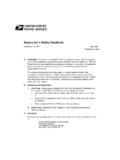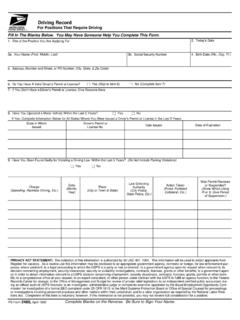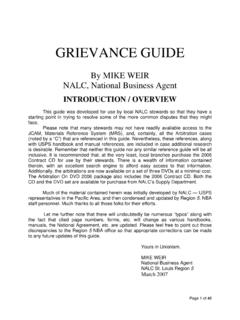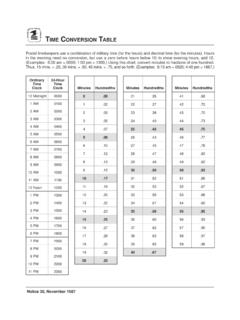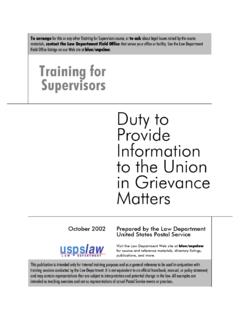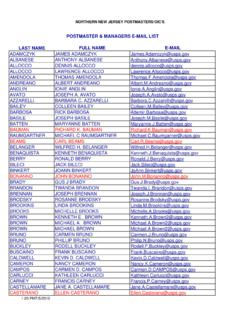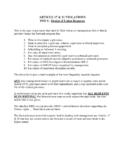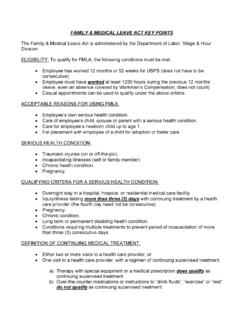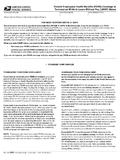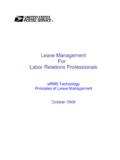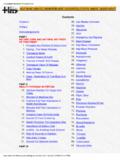Transcription of Supervisor s Guide to Handling Grievances
1 Supervisor s GuidetoHandlingGrievancesHandbook EL-921 August 1990 PrefaceThe Postal Service, working in conjunction with the national unions, strives continuously toward improvement of the labor management climate by fostering better communication, greater trust, and improved working relationships at all levels of the company -You are a key figure in promoting this philosophy, As the management team member that is involved from the outset in problems, complaints, and Grievances , you can contribute to the improvement of relations between management and labor by giving your sincere attention and by making every effort to settle differences even before they reach the formal grievance material contained in this booklet is intended to serve only as broad guidelines.
2 It is provided to assist you in the Handling of Grievances and disciplinary actions- The guidelines are not necessarily requirements that must be strictly complied with or blindly followed, and no employee rights are created when these guidelines are not Labor Relations DepartmentContents1. Introduction ..111. Handling Grievances ..2A. General .. 28. Supervisory C. Disciplinary Role of the Step 2 E. Summary'..10 111. Discipline ..11A, basic B. Disciplinary C. Just Disciplinary Arbitration ..20 E. How Much Get the Weigh and Decide ..25C. Take Check grievance Summary Purpose ..26B.
3 grievance Summary - Step grievance Summary - Step grievance Summary - Step IntroductionThis material provides a broad guideline for supervisors in Handling Grievances and disciplinary actions under the current collective bargaining agreements. No attempt has been made to answer specific questions nor to develop a cure-all for grievance processing. Effective grievance processing can only be accomplished through additional experience and by applying the concepts outlined in this continue improving in labor relations. every Supervisor must have not only a thorough knowledge of. but also a belief in.
4 The philosophy of labor relations as expressed here. You. as supervisors. must work hard to develop and maintain a positive labor relations attitude in the Postal Service. You have the first opportunity to open communications so that mutual trust, two-way dialogue, and an environment of cooperation are developed between management and working out problems before they become Grievances and by resolving Grievances at the lowest possible step, you can make a contribution to the overall improvement of labor-management relations that will impact favorably on all facets of our Handling GrievancesA. GeneralThe collective bargaining agreements cover all matters agreed to between management and the unions regarding wages, hours of work, overtime, and other terms and conditions of employment.
5 Parts of some handbooks, manuals and published regulations of the Postal Service also contain material that directly relates to wages, hours, or working conditions as they apply to employees covered by the National Agreements, and that material must contain nothing that conflicts with the Agreements. As management conducts its business, there is always the possibility that an employee and/or the unions may believe that a violation of the Agreement(s) has occurred. While problems are best resolved before they become Grievances , supervisors must know how to handle Grievances quickly and satisfactorily when they do Supervisory ResponsibilitiesManagement is responsible for directing its operations employees and/or the unions, however, have the right to file Grievances if they believe their rights have been violated, A Supervisor must be in a position to respond properly should a grievance arise.
6 Use the following guides in Handling Grievances :* Treat every grievance as though it were sure to wind up in arbitration, but do not be adversarial in your approach-* Allow employees and/or unions a full opportunity to present their points of view. Listen: don't interrupt.* Make sure that time limits and other procedural requirements under the grievance procedure have been observed,* Know the background of the grievance , and the existence of prior similar cases and their outcome, Know the applicable provisions of the Agreement and any information relating to past policies and practices.* Make sure the employee and/or the union has presented the full story, specified the exact nature of the alleged violation, and stated the precise remedy that is sought.
7 * Make a detailed and accurate record of the results of the investigation. This should include:* Any pertinent payroll documents.. * Work, personnel, or disciplinary * A summary of the employee's and/or the union's and management's .* The names and statements of witnesses, . * The nature of any evidence presented by either side,We must stress the importance of finding out who, what, when, where, and why. Make absolutely sure that you have all the facts, This requires asking is the responsibility of local management to resolve as many Grievances as possible at Step 1. When a grievance has merit, you should admit it and correct the situation.
8 You are a manager--you must make decisions--don't pass the buck, Your decision on a grievance should be based on the facts of the situation and the provisions of the National Agreement. You should listen to the employee's or union's grievance and make sure of the 's and Don'ts* Do try to make the decision fairly.* Do try to be reasonable.* Do take the action you believe should be taken based upon the individual circumstances involved.* Do give the employee or the union a complete answer including the reasons for your decision.* Don t make a decision in anger.* Don t try to "get back" at an employee or the union for some other action you didn't like.
9 * Don t tell the union you do not have the authority to make a decision,If you do not have the answer, advise the union steward or representative that you will get back to him or her and then seek assistance from higher level management in developing a time limit for each step is a limit, not the length of time you are expected to take to reach your decision. You are expected to expedite your decision, but not at the expense of sound judgment, If you follow the policy of fair, firm, and decisive, you will find that fewer Grievances are appealed to Step 2. Study the facts thoroughly and determine how they relate to the provisions of the Agreement.
10 If you then believe the employee's or the union's grievance is unjustified, deny the grievance . Be certain you can justify your Disciplinary GrievancesOnce the discipline has been initiated, the employee or the union may grieve the discipline within the time limits specified in Article 15. Just because the discipline was fully discussed at the time of issuance is no reason for the Supervisor to breeze through Step 1 with a quick, " grievance Denied." Points which should be covered by the Supervisor in any such Step discussion include* Is there a misunderstanding as to management's reasons for having initiated the discipline* On what basis does the employee feel that management lacked just cause?
